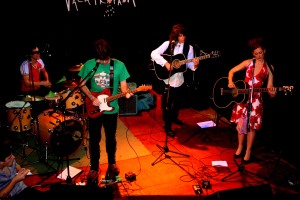Last Friday, myself and some friends, including two Mexicans and an Argentine who’d been living in Mexico City for the past several years, went to see a band called La Musical Mexicana (you can see a video of them performing live here). My new friend, Leo, the Argentine who’d been living in DF, told me the band was made up of three “argen-mex” musicians. This was a new turn of phrase for me, but apparently the number of Mexicans who are actually the children of Argentine parents, exiled in Mexico during Argentina’s Dirty War (1976-83), is so great as to merit its own moniker, especially now that their ranks have swelled to accommodate the many young Argentines who moved to Mexico City to escape the social and economic turmoil of Argentina’s 2001 financial crisis.
The band played a kind of south-of-the-border, retro-rock-country mix – or maybe that’s “neo-mariachi” – sung in both Spanish and English, with a mix of its own songs and some classics, which had my Mexican friend Cecy howling and singing along.The underground bar was decorated with Mexican paper-cut-out skeletons, like those used to celebrate the Day of the Dead. But the band members, the boys with their aquiline noses and mullet haircuts, and the tall blonde singer with her sharp outfit and lovely high-heels, had that hard-to-define yet impossible-not-to-recognise Argentine look about them.
During the 1970s, around 650,000 Argentines – mostly leftist Peronists or members of Marxist revolutionary groups like the Montoneros – fled their country as political exiles, escaping the brutal dictatorship that ruled Argentina from 1976-1983. Around 10,000 Argentines settled in Mexico, mostly in the capital, Mexico City (or DF, for Distrito Federal). Many of those exiles stayed in Mexico for good, while others were happy to return after the restoration of democracy in Argentina. But an interesting new study (published as a book, El Retorno de los Hijos del Exilio or ‘The Return of the Children of Exile’) shows that the children of returned exiles – whether born in Mexico, France, or any other country that accepted Argentina’s political refugees – have been marked by having left their country of birth to live in an Argentina entirely unknown to them. In fact, the study showed that 17% of people interviewed said they had “no nationality.”
“Going ‘home’ was just another forced migration for many children of exile,” said Roberto Aruj, a professor at the state University of Buenos Aires and co-author of the book. “They were born or raised abroad, and after adapting to their own uprooting or that of their parents, they had to drop everything and return to Argentina on someone else’s say-so.”
Meanwhile, another recently published book, called The Rabbit House, is said to be the first account of what it was like to grow up with parents who were waging a guerrilla war against the state. Laura Alcoba, at only six years of age, knew how to keep a secret, and how to tell if she and her parents were being followed in the street. Her parents, who were Montoneros, moved the family around from one safe house to the next, but after Alcoba’s father was caught and sent to prison, she and her mother went into hiding, living in a derelict house that masqueraded as a rabbit farm. Alcoba left school and she and her mother rarely went outside.
“It might seem strange, but for a little girl in that situation being in hiding just becomes part of everyday life,” the author, who teaches Spanish literature at a Paris university, told the Guardian newspaper. “She learns very quickly that in winter it’s cold, fire burns and we could be killed at any moment. But it’s overwhelming for a little girl because of the seriousness of any little gaffe she might make that could put the group in danger. She doesn’t always manage what she is supposed to say and not say. It’s as if she’s in a costume that’s too difficult to wear.”
Later Alcoba and her mother went into exile in Paris. Her father was eventually released from prison but her parents’ relatinship did not survive. Nor did most of their fellow revolutionaries who shared the rabbit farm – nearly every last one was killed by the military.
“People have said this is a story of stolen childhood,” Alcoba told the Guardian. “But I think it would be obscene to complain of my lost childhood when so many people lost their lives. It was violent, but it was a childhood all the same.”
Filed under: arts and culture, human rights | Tagged: books, Dirty War, exile, Mexico, Montoneros, music | Leave a comment »








